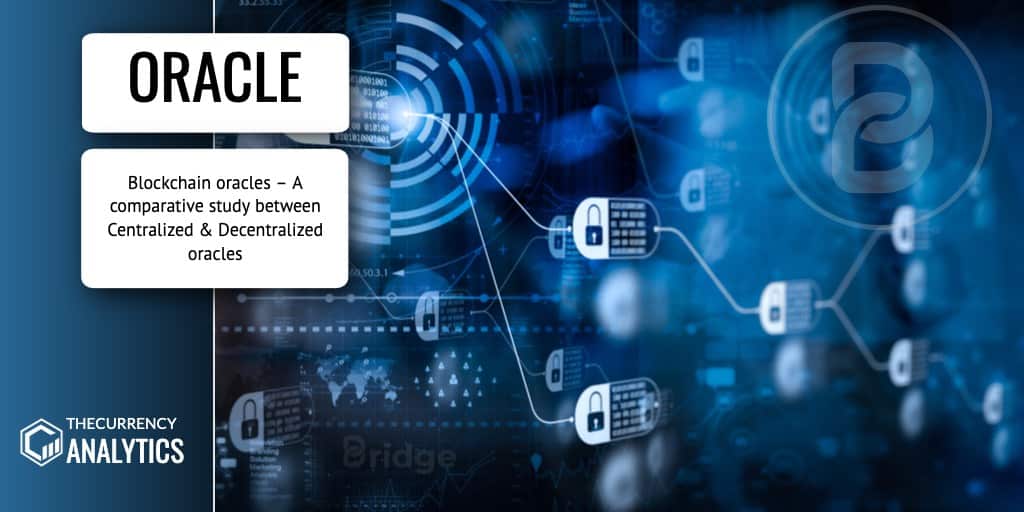
Smart contracts are bustling with huge potential to redefine major industries in the world and for better. But, despite their solid prospects, they have not been able to gain mass adoption till date. A major reason behind that is, to contribute to real-world use cases in mass scale, smart contracts need off-chain or external world data. But blockchain’s underlying protocols strictly prohibit accession to off-chain data which has ghastly limited the functional scope of smart contracts big time. And this is where oracles offer to help.
A sneak-peek into blockchain oracles
Well, blockchain oracles can be defined as 3rd party services or middleware which serve to connect blockchain’s on-chain world with the off-chain or real-world data. More precisely, oracles fetch real-world data from off-chain sources which are then injected into smart contracts so that they can realize their true potential at the optimum. Put simply, oracles improve the scope of functionality for smart contracts and empower them to contribute more actively into their real-world use-cases.
With blockchains evolving and crypto experts expecting a more enhanced role of smart contracts today, oracles are becoming even more significant these days. As per market sources, the current market capitalization (combined) of oracle-based coins today is projected to touch a solid $6 billion mark in near future.
Comparison between Centralized and decentralized oracles
Oracles can be primarily divided into centralized as well as decentralized oracles.
Centralized oracles
Centralized oracles serve as one single entity which fetches information from an off-chain source for smart contracts. Now, these are somewhat like our conventional fiscal system- just as the traditional finance scene is governed by one single entity, centralized oracles too are completely controlled by one particular entity. But while the centralized system appears to be an economical solution with low maintenance benefits yet such oracles often suffer from bottleneck issues.
Decentralized oracles
Unlike the centralized counterpart that relies on one external source, a decentralized oracle counts on several external sources to provide data to blockchain smart contracts. As a result, they are in a better position to verify authenticity of data collected compared to centralized oracles. In other words, decentralized oracles assure tamper-proof, authentic and more reliable data compared to centralized oracles. They follow a cutting-edge ShellingCoin mechanism that refers to a system where every independent source reports data without coordination with each other.
Moreover, the decentralized ones assure comparatively faster operations. However, centralized oracles, although slower yet offer better security. So, if higher speed and better data authenticity are major concerns, you have to go for decentralized oracles. On the other hand, if you want a budget option and can adjust with a slow performance, you might go for a centralized oracle.
DeFi projects prefer decentralized oracles
The DeFi scene is fast gaining traction in the current blockchain market and that’s wonderful news anyday. Now, DeFi apps especially want decentralized oracles as the centralized ones are too slow for them. Besides, they are always on the lookout of authentic data which is not always viable with centralized oracles.
A major bunch of DeFi protocols, like MakerDao, Compound, Aaye or Uniswap, use oracles to source off-chain data. They mostly run on Ethereum blockchain -but then, Ethereum has sparked criticisms lately for low scalability and exorbitant gas fees. The crisis has further resulted in the rise of alternate blockchains for DeFi transactions. A major example here is TRON blockchain and it is more advanced, more scalable, faster and also more affordable for DeFi transactions. Recently TRON has got its first ever dedicated public oracle called Bridge Oracle. It is a decentralized oracle which allows access to a wide range of external data sources. Besides, the Bridge oracle allows adding different kinds of proof to establish the authenticity of the injected data.
The new oracle has gained huge popularity of late. In fact, the Bridge oracle IEO was completely sold out in just a few hours of the launch. Bridge oracle also extends discounts to those who choose to pay for the oracle services through Bridge oracle’s native token BRG. Users can also pay through TRON’s native coin TRX.
Get the latest Crypto & Blockchain News in your inbox.